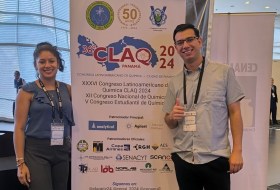News
Unicaucan students present their research at the XXXVI Latin American Chemistry Congress.
William Parra and Ingri Reina, members of the Research Group on Electrochemical Processes (GIPEL), participated in this exchange of science and technology that addresses urgent development opportunities in Latin America.
During the XXXVI Latin American Chemistry Congress held in Panama City, University of Cauca students William Parra and Ingri Reina presented their research as speakers, focusing on the high scientific interest area of environmental pollution from carbon dioxide (CO2) and toxic metals (Hg, Cu, and Zn) in water due to illegal mining in the Cauca department.
As members of the Research Group on Electrochemical Processes (GIPEL), affiliated with the Department of Chemistry, they showcased their topics during the event, which took place from September 30 to October 4 at the Sortis Hotel. They engaged with the Latin American scientific community, sharing the advancements made by the University of Cauca through its Research Groups in addressing global warming, reducing the carbon footprint, and studying new materials for the removal of metals that affect water sources.

Provided photo
The research results titled "Electrochemical Reduction of Carbon Dioxide on Copper Electrodes Modified with Co/Cu for the Selective Production of Methanol" and "Study of the Electrochemical Behavior of a Terpyridine-Derived Ligand Interacting with Copper, Zinc, and Mercury Ions in Aqueous Medium" generated significant interest among attendees at the event, facilitating the exchange of science and technology to address urgent development opportunities in Latin America.

Provided photo
The Research Group on Electrochemical Processes (GIPEL) expresses gratitude to the Faculty of Natural Sciences, Exact Sciences, and Education, as well as to the Vice Rectorships of Research, Culture, and Well-Being at the University of Cauca for their support in enabling students to attend this important event.
Writing: Communication Management Center


